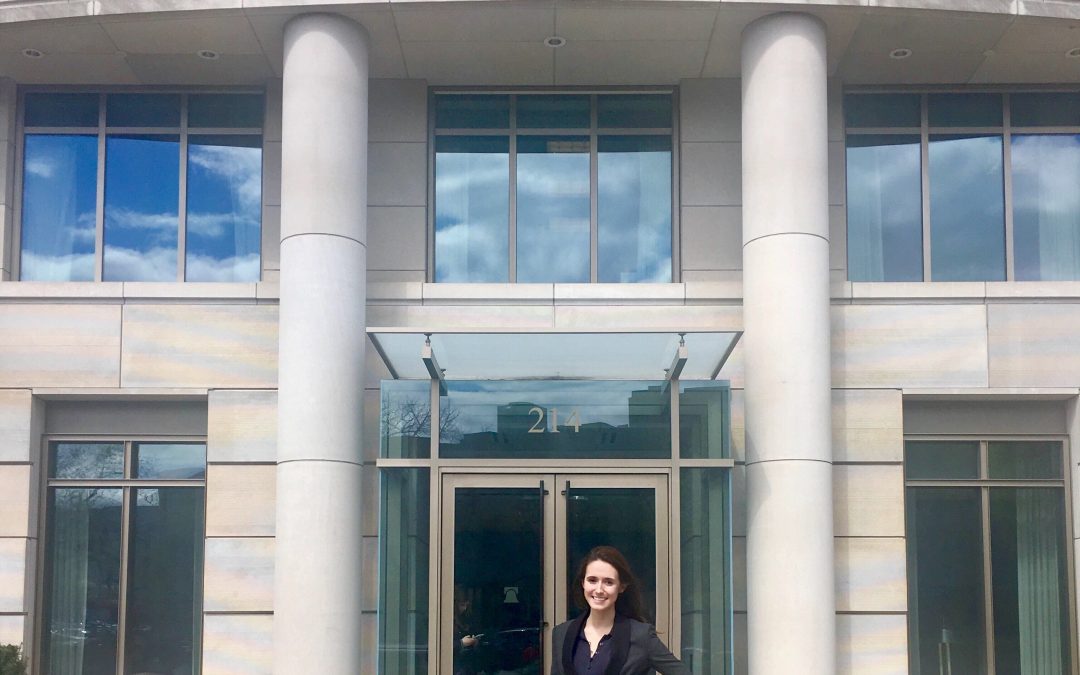
by Madison McHugh | Jun 18, 2018 | Internship Experiences, Undergraduate Students
My name is Iulia Lupse, and I am studying Diplomacy and International Relations with a minor in Russian and Eastern European studies. I interned in the Media Relations department at the Heritage Foundation in Washington, D.C. I was initially interested because it is the leading conservative think-tank in the United States. I completed extensive research before applying, and when I learned about their Young Leaders Program, I was hooked. The program offered skill development briefings, policy briefings, and first principle lunches. In the skill development briefings, we learned valuable skills to navigating Washington D.C., such as public speaking, networking, and resume building. In the policy briefings, interns were informed on numerous subjects such as defense, foreign policy, healthcare, education, and more. The First Principles Lunches were my personal favorite as we participated in discussions about the founding principles, the conservative movement, and the philosophy behind conservatism.
While my interests lie in national security and defense, the skills I learned in the Media Department are useful for a wide-range of jobs. My main responsibilities included logging print hits, writing press pitches, keeping the Heritage Press and Heritage website up-to-date, and compiling media lists. On less busy days, I attended Heritage events and others around the city, allowing me many networking opportunities. Initially, I found that my greatest challenge was public speaking and networking, because I tended to be shy in conversation – however, I overcame this fear during my time at Heritage, and it certainly paid off.
The highlight of my internship was attending C-PAC. I had the pleasure of meeting President Kay Cole James, Ivanka Trump, Paul Teller, and Ben Shapiro among many others. I also completed projects with my mentor in the defense department at the Heritage Foundation, including research on the new defense bill and the importance of nuclear deterrence. These experiences were crucial during my time with the Heritage Foundation.
Although I plan to continue my pursuit in intelligence careers, the connections I made and the skills I gained will be valuable in any field I will choose in the future. The Heritage Foundation gave me the opportunity to apply and expand my knowledge and skills. I would highly recommend this internship to others because it provides a wonderful learning experience and networking opportunities. I am ever grateful for what I learned, and I am even more excited to continue learning based on my experiences in D.C.
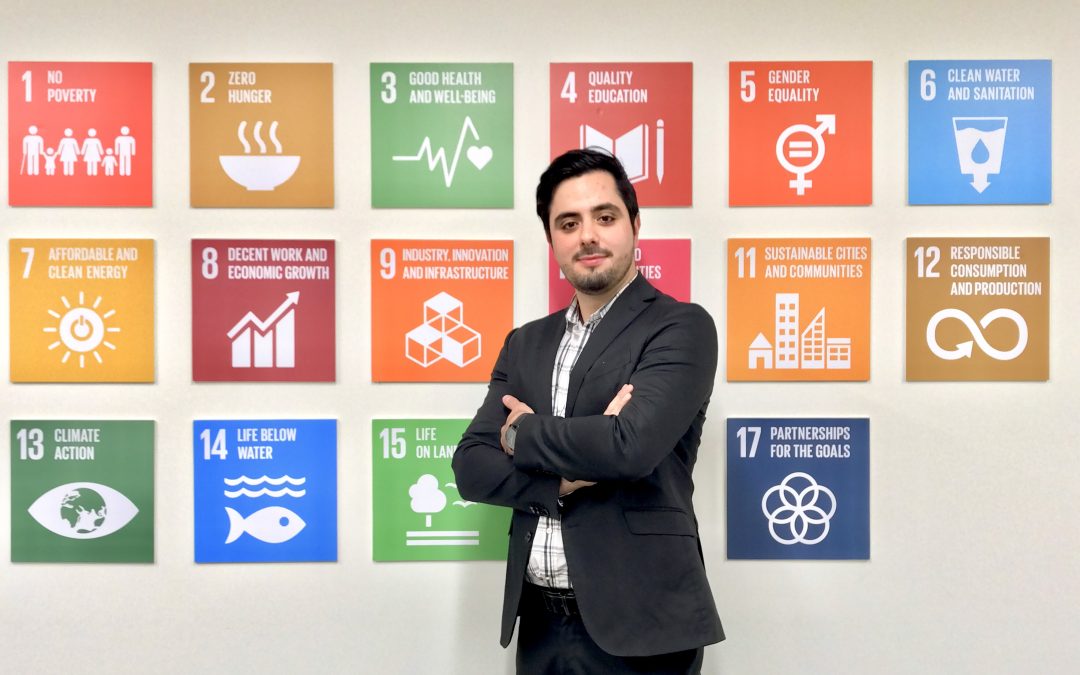
by Madison McHugh | May 18, 2018 | Internship Experiences, Undergraduate Students
My name is Ahmet Yoruklu, and I am a senior studying Diplomacy and International Relations with a double major in Economics and a minor in Russian. I am currently interning at the world’s largest corporate sustainability initiative, the United Nations Global Compact, whose mission is to mobilize a global movement of sustainable companies and stakeholders to create the world we want. Since I have been interested in multi-stakeholder collaboration between the private and non-business sector for development and sustainability across the world, I can’t think of a better fit for my personal development in this space.
As I work on the Client Engagement team here at the UN Global Compact, I get to interact with our business participants on various topics; from communication on annual progress reports to post-event follow-up campaigns. In addition, I conduct rigorous research on prospective participants and assist my supervisor in executing recruitment procedures efficiently.
What I enjoy the most about my internship is that I have the privilege of learning about the world’s largest companies and MNC’s as part of my work. It is an outstanding experience to witness how businesses align their operations and business strategies with global goals for a more sustainable world. Moreover, the opportunity to attend flagship events on different themes, such as the Commission on the Status of Women as well as the SDG Business Forum during my internship period at the UN Headquarters is certainly an invaluable experience.
When it comes to my studies at Seton Hall, what I do here on the Client Engagement team is very much related to Diplomacy and International Relations as well as Economics. Since we are a multi-stakeholder organization, we communicate with numerous entities from all over the world which requires a certain knowledge of diplomatic language and cultural awareness. In terms of diplomacy, I am certainly reaping the rewards of what I have learned studying diplomacy as I execute on my tasks, whether writing a report or utilizing critical and rational approaches during decision-making processes. Combining my knowledge of diplomacy with economics has created the best foundation for me to understand why for-profit entities take certain actions in the global economy and how I can come up with innovative ideas and solutions to achieve our agenda at the UN Global Compact. Both diplomacy and economics prepared me to be more resourceful when it comes to communicating with private sector companies and engaging them with our organization.
As I gain new experiences with this internship, it has helped me become more realistic about my career goals in terms of what path to follow in the near future. Through the experiences I add to my skillset, such as CRM management, strategic partnerships, and corporate communications, I am becoming more prepared than ever to pursue my goals in the sustainability space.
I would definitely recommend this internship opportunity to anyone who would like to gain hands-on experience in private and non-profit sector collaboration. The UN Global Compact provides an outstanding environment for those who are passionate about fulfilling global goals via local business in every part of the world – from the center of the world, New York City.
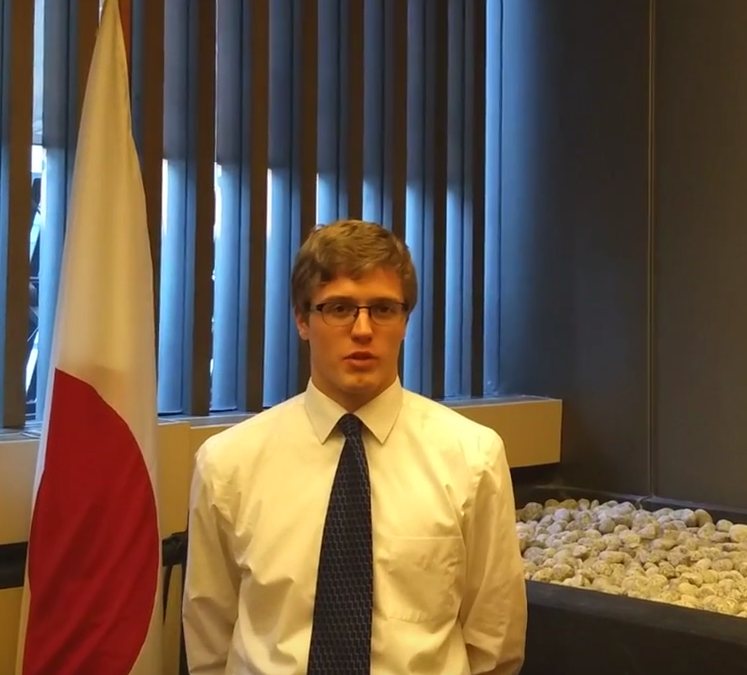
by Madison McHugh | May 3, 2018 | Internship Experiences, Undergraduate Students
My name is Trevor West, and I am a junior at Seton Hall University majoring in International Relations & Diplomacy, Modern Languages (Japanese/Chinese), and Philosophy. I am currently interning at the Japan Society Language Center in New York City, a non-profit organization founded after World War II.
I have a long-standing interest in the Japanese language and culture, reaching back to my childhood and early exposure to Japanese pop culture through anime, video games, and music. I pursued these interests further and began studying the language in hopes of being able to understand and experience more aspects of the culture. The Japan Society is a great organization that helps individuals to learn Japanese as well as appreciate the vast richness of both ancient and contemporary Japanese history, art, and more.
The essential tasks I complete at the Language Center include a variety of administrative work, such as: communicating with clients, registering students for classes, and managing the student information database by adding and updating information. I also interact with staff and see the living process of a school-system. My internship relates to my international relations curriculum as I am experiencing how a non-profit operates and meets its goals.
This internship has been a first-hand look into a system that, until now, my classes have only focused on in the abstract aspects. The mission statement of the Japan Society, with its goal to deepen “mutual understanding between the United States and Japan in a global context” appears abstract until put into practice. The Language Center’s practice fulfills this deepening of mutual understanding by facilitating classroom experiences, and my responsibility is to ensure that interested individuals receive excellent service. These individuals will learn from the courses and further their understanding of the Japanese language and culture, and the Japan Society will be one step closer to their goal of expanding U.S.-Japan relations.
My internship with Japan Society has been a humbling experience and shown me how amazing NGOs are in practice. It is one thing to learn about organizations, institutions, governments, or any other complex topic in the classroom, but actually working and getting to know the feeling of how an organization functions is different. The internship has given me practical knowledge that the classroom has not precisely because physical experience helps one to grasp the abstract concepts learned in the day-to-day functioning of an organization.
This internship is exciting because it is an opportunity to see the real-life application of what I have learned so far in my classes. While the skills I use daily are relatively basic, interning at the Language Center has given me a way to connect with others who are influential in promoting deeper U.S.-Japan relations and allowed me to give back and participate in the mission. Thus, the best part of this internship is the happy union between what I have learned in class and the tangible functioning of Japan Society as well as the opportunity to further U.S.-Japan relations.
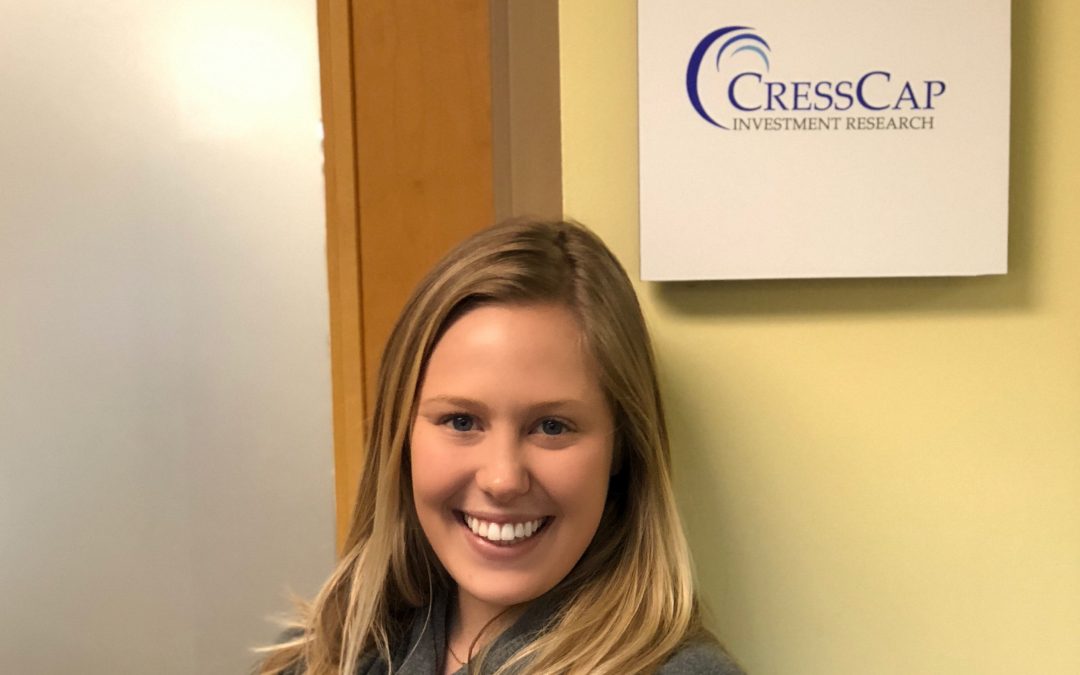
by Madison McHugh | Apr 5, 2018 | Internship Experiences, Undergraduate Students
My name is Tela Wittig, and I am a junior Diplomacy and International Relations student. I have taken a convoluted path to my current internship and career field, changing my focus from international criminal law and law enforcement to international business. It was through this journey that I came to intern at CressCap Investment Research.
CressCap is a small, innovative company that has essentially automated many of the functions of a financial analyst through fractal analyses of stocks’ fundamentals. Although investment research is considered far removed from the international relations education I received, my assignments have been shockingly compatible with my skillset. I recall coming into the office for my second interview as well as my first opportunity to meet with the whole team. They asked me several questions about how I had found out about the internship and why I had decided to follow through with the application. Through these questions, it was clear that they were beating around the point that I had no finance, sales, or programming experience – the skills most natural to FinTech startups.
My final interview was with the COO who asked me outright why I wanted to work at CressCap and what I wanted out of this experience. I answered without hesitation that I had made a commitment to moving into the private sector and I intended to learn. Then we went through the CressCap website, and I explained the grammar and style changes I thought would improve their external image. I suppose it’s just lucky that I walked into a group of people who are invested enough in their business that they appreciate that kind of criticism from an interviewee, but the chance I took paid off. Since then, I have found the office to be a great place for expressing myself and feeling heard.
Today, I am three months into my first experience in finance. My passion for the finance industry has grown, and my new knowledge has helped me identify and express what I want to do in my professional career. I am working hard to learn all that I can about running a business, including sitting in on meetings, asking questions, and working within our systems. Moreover, while learning new skills, I have also come to realize that there are many aspects of my international relations education that I can maintain as I move farther into my finance career.
In the finance sector, it turns out that reading, writing, and language skills are key. This has worked to my advantage in many ways. My education in Diplomacy and International Relations helped me improve my writing and analytical skills. In addition, I worked as an English writing and grammar tutor on the Seton Hall campus. These experiences helped me realize my love for the English language and further advance and improve my Chinese language education. I know now that I can pursue each of these subjects in conjunction with finance and make myself indispensable by possessing coveted language skills and expertise. As a result, I was chosen to work with CressCap’s CEO to write weekly contributor articles for Forbes.com with top and bottom international stock picks using our platform’s analysis. In this way, CressCap has been an exceptional experience because it has allowed me to tailor my unique skillset to the tasks at hand. This has brought all of my passions together to create something I really love to do, which is an exceptional opportunity at 20 years old. I highly recommend the internship for students who want to learn about finance from the ground-up and increase their marketability in the private sector.
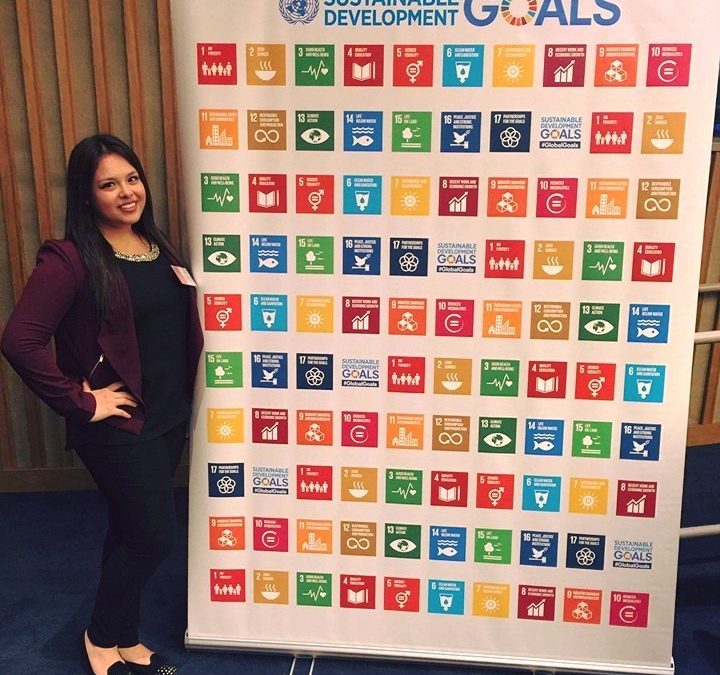
by Madison McHugh | Jan 10, 2018 | Internship Experiences, Undergraduate Students
My name is Laura Muñoz, and I am currently an undergraduate student at the School of Diplomacy and International Relations at Seton Hall University. As part of my final semester of my undergraduate career, I completed a full-time internship at the 20th District Legislative Office in Union, New Jersey alongside the Director of Constituents as well as Assemblywoman Annette Quijano.
As an intern, I experienced magnificent opportunities, met amazing public officials, and learned about the in-depth processes of local politics. My main responsibilities as an intern at the legislative office was assisting Union County constituents who visited the office regarding claims, renewals, and referrals. In addition, I was often placed at the Elizabeth office to complete hands-on work.
During my time with the 20th District, the office partnered up with other legislative teams to provide supplies to Puerto Rico, and I assisted in facilitating donation teams. We completed many more local and state-wide events and community fundraisers. I also completed work in the field with campaign-related volunteering outside the office for Assemblywoman Quijano, particularly during the gubernatorial debate between the two governor candidates for the New Jersey election, Phil Murphy and Kim Guadagno. In addition, I was invited by the Chief of Staff for Senator Lesniak to see Barack Obama’s endorsement speech for Phil Murphy – an incredible event!
My internship with the 20th District has helped me a lot with practicing diplomacy in the real world. This internship has helped me put my skills into action. Networking is a big part of what our professors highly encourage, and I have done a lot of networking with my internship. This internship has made me realize how much more I want to work in the international field. Yes, I have learned a lot of local politics and how important it is; however, I do like more of relations between countries and how that affects the entire world. My internship at the office has also reminded me of the importance of remaining educated. Having conversations with people has been very rewarding because I use the knowledge and skills that I have learned in class, and it is amazing to have a conversation with someone about world politics and give my informed opinion.
I would recommend this internship to anyone in the Diplomacy school because I believe that the 20th Legislative office is one of the most diverse offices that New Jersey has. This internship thus far has helped me learn, grow, and realize how important it is to practice diplomacy and do what you love.
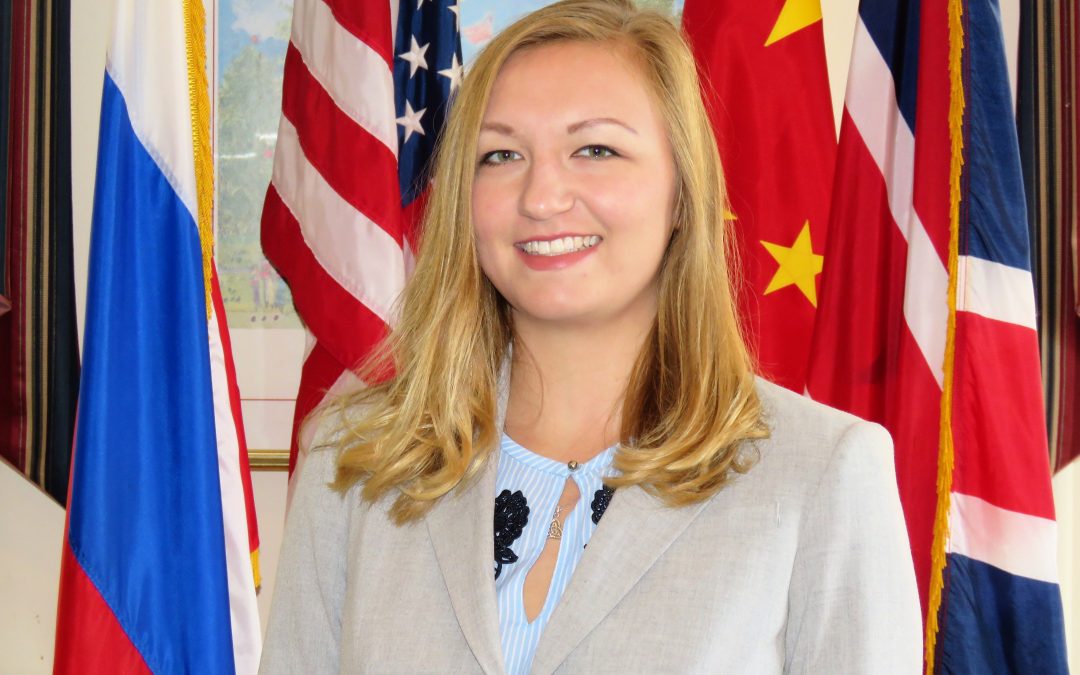
by Madison McHugh | Dec 13, 2017 | Internship Experiences, Undergraduate Students
My name is Lindsay Smetanka, and I am a senior at Seton Hall University majoring in Diplomacy and International Relations with minors in Arabic and Catholic Studies. I worked at International Crisis Group in New York City as a Government and Foundation Relations Intern. International Crisis Group is an independent, non-profit, non-governmental organization committed to preventing and resolving deadly conflict. Through field analysis, field advocacy, and policy suggestions, Crisis Group directly handles crisis and educates decision makers on future steps to resolve conflict happening throughout the world.
My day-to-day activities included tracking grant obligation outputs (advocacy meetings, reports, and briefings), working on database management projects, engaging with donors, and researching donor prospects. I was most interested in advancing Crisis Group’s monitoring and evaluation method to accurately measure the impact that the NGO’s outputs have in the international system, especially in areas experiencing crisis. With the rise of social media and technology, international NGO’s need to advance as well by using these methods to track who is viewing their content, where and if it is making the impact originally proposed, and how to improve engagement with donors and stakeholders. My coursework prepared me to think critically, write concise briefs, and meet deadlines. I learned how the grant-writing process works and how to communicate with professional contacts.
I believe that my internship has assisted in my goal to obtain a position as a development officer after graduation. Many jobs in the field require applicants to have experience with prospect research, Raiser’s Edge, donor engagement, and project management – all of the skills that I gained at Crisis Group. In addition, the internship exposed me to networking events and seminars in the city that helped me understand the non-profit development field better. As my first “big city” internship, it was definitely intimidating at times. The biggest challenge I faced as an intern was feeling like a small fish in a big ocean. When I first started, I doubted my qualifications, but after spending more time around my coworkers and the office culture, I became more comfortable and confident.
Some advice I can offer is that asking questions is an integral part of an internship, whether asking experienced professionals about their education and job history or asking coworkers about administrative processes. I gained knowledge through asking about something that I did not know or fully understand. In addition, networking in the office is essential to making the most out of the experience. Talking to coworkers on coffee and lunch breaks can open up new opportunities and help create working friendships. It also helps create a team mentality within the office, which is so crucial in a non-profit organization. I always left the office feeling confident that I helped advance the Crisis Group’s administrative process and mission. This feeling was the most rewarding part of my internship. I would definitely recommend this internship to my peers, as well as additional internship positions within Crisis Group.
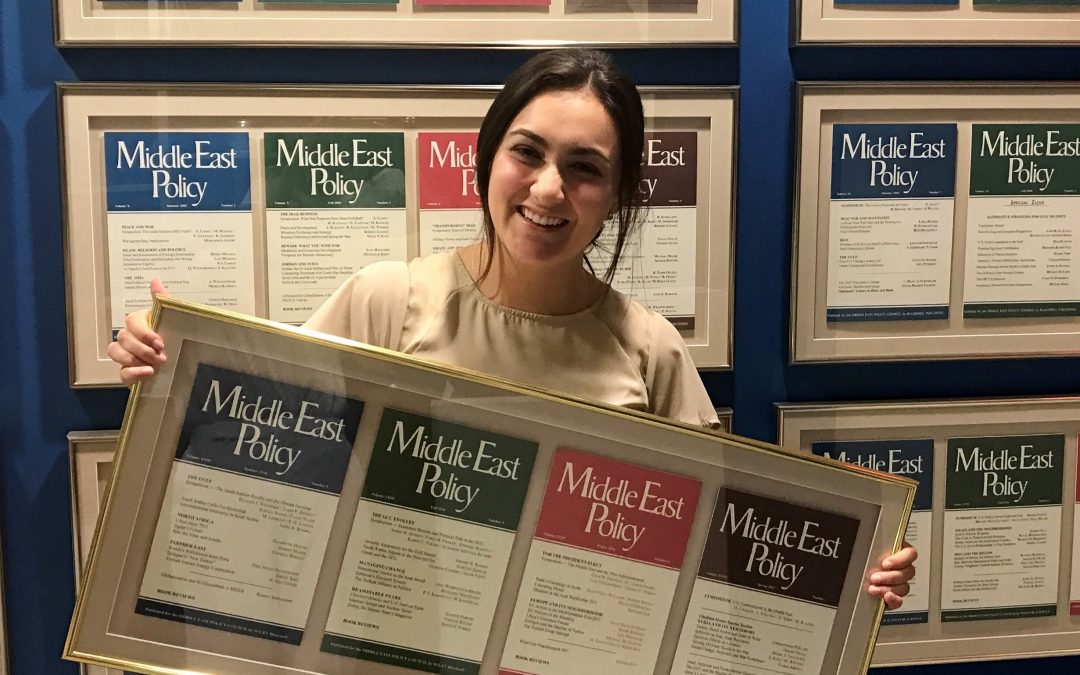
by Madison McHugh | Nov 15, 2017 | Internship Experiences, Undergraduate Students
My name is Gabrielle (Gabi) Hunt, and I’m a rising senior studying Diplomacy, Environmental Studies, and Arabic at Seton Hall. I wanted the organization I interned with this summer to involve work synthesizing all of my interests. Ultimately, I decided on Middle East Policy Council (MEPC) in Washington, D.C., and I could not imagine a better fit.
MEPC is a nonprofit think tank that focuses on education and advocacy work in Middle East issues. It publishes the leading Middle East affairs journal, Middle East Policy (MEP), hosts quarterly Capitol Hill conferences discussing current events, and has an educational outreach branch, TeachMideast, designed to make Middle East issues more accessible to K-12 teachers and students.
I was one of two interns at MEPC who dealt broadly with educational outreach, event coordination, and social media management, along with inputting edits and proofreading articles to be published in MEP. I also wrote a few of my own pieces on current events and completed a 10-week independent project with my fellow intern. For our project, we started a video series aimed at capturing the lives of Arab-Americans around the D.C. metropolitan area. The topics of their interviews typically encompassed how their professions, interests, and passions relate to their cultural identity.
In addition to the larger project, I conducted a series of small projects throughout the weeks – like writing TeachMideast focus pieces – which brought together my interdisciplinary interests. With focus pieces in particular, I was given the opportunity to write about anything I found interesting – from the Saudi Vision 2030 plans to reducing dependency on oil, to the origins of the Boycott, Divestment, and Sanctions movement.
I loved my 10 weeks working at MEPC, especially because I was given so much opportunity to be creative through self-guided projects. Through independent work, I strengthened my professional development and time management skills. I also enjoyed my inclusion in the publication process of MEP, not only because of my interests in writing and editing, but because the responsibility of accurately inputting edits and proofreading fine-tuned my attention to detail and precision. My favorite part about MEPC is that I always felt like a valuable team member whose input was valued.
Overall, I could not be happier with the senior leadership internship experience I had, and the time I was able to spend working in D.C.
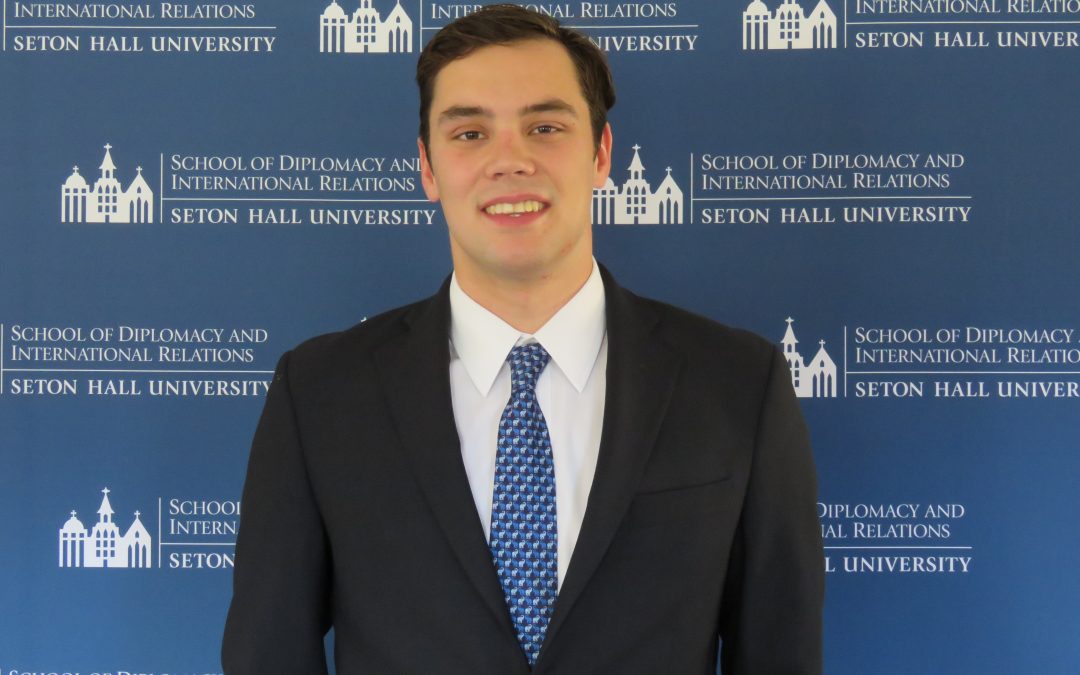
by Madison McHugh | Oct 18, 2017 | Internship Experiences, Undergraduate Students
My name is William Smith, and I am studying Diplomacy and International Relations at Seton Hall. Over the summer, I had the opportunity to intern with Waterfront Development Corporation Limited, a crown corporation tasked with ensuring the prosperity of waterfront areas in my home province of Nova Scotia, Canada. Waterfront areas are extremely important to the coastal area of Nova Scotia, making their prosperity crucial to the success of the province’s tourism industry.
My responsibilities related primarily to the promotion and execution of the corporation’s major summer event, the 2017 RDV Tall Ships Regatta. The regatta is a 7,000-nautical-mile sailing race in which spectacular vessels, known as tall ships, make their way from country to country over the course of the summer. The regatta makes 10 stops in different ports across the province, representing major tourism opportunities for the host ports. The race is heavily promoted as a spectator event as the ships themselves are attractions in their own right. However, there are opportunities to actually sail aboard the majority of the ships visiting as well.
Due to the lack of publicity, I was specifically tasked with creating interest in the sailing opportunities in order to make the event successful as an experiential one as well as a spectating one. To meet the expectations of my tasks, I collaborated with television and newspaper professionals in order to promote the events and sailing opportunities to the general public. I also interacted with some of the crew members of the ships that appear in the regatta who provided me with more information to better promote the experiences that exist. I realized that while television and newspaper promotional activities were beneficial in increasing awareness for the general public, in order to be most effective, I also needed to identify and contact target groups, a task that took up much of my time over the summer.
The opportunity to assist in promoting my home province’s attractions, particularly through a large international event like the Tall Ships Regatta, was extremely rewarding as I recognized the value of bringing the event to fruition for the sake of the province’s success and gained valuable event-planning and management experience.









